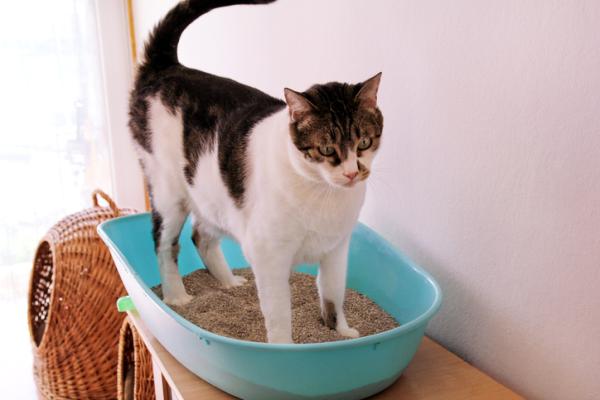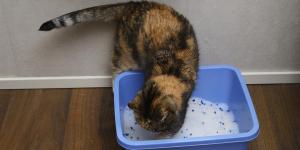Why Do Cats Run Away From Their Poop?



See files for Cats
The reasons why cats run away from their poop can be due to instinct, but it is also possible they do so because of a problem in the home. For this reason, when a cat has a zoomie out of the litter box, it doesn't necessarily mean there is a problem, but we have to determine the cause in case there is one. The reason cats run away after pooping is often related to their natural instinct. This refers both to how they relate to their environment and how they approach hygiene. At AnimalWised, we explain cat zoomies after pooping by asking why do cats run away after pooping?
What are cat zoomies?
Before we explain why a cat runs away from their poop, we need to explain a behavior known as zoomies. Zoomies are short bursts of energy which a cat can perform for seemingly no reason. Unless they have an issue such as stress or even certain medical conditions such as hyperthyroidism in cats, zoomies are completely normal behaviors. They are most associated with young cats, but it will depend on the individual.
In this case, if experience cat zoomies after pooping, it could simply be the cat's normal behavior. In these cases, they aren't necessarily related to the cat of defecating itself. The cat will have zoomies after pooping just as they might have zoomies after eating or even just lying down for ten minutes.
Below, we explain some specific reasons why cats run away from their poop.
Why does my cat run away after pooping?
Here are some of the basic potential reasons why a cat may run away after they poop:
- Survival instinct
- Relief
- Urinary infection
- Renal problem
- Dirty litter
Below we look into this reasons and provide a little more context. Although in most cases it is not abnormal for a cat to run away from their poop, you may find there has been a hidden issue which you have not previously suspected. Some of these may require a trip to the veterinarian.
Survival instinct
The engagement of their feline survival reflex is one of the most common theories to explain why a cat runs away from their poop. When a dog defecates outside, they often look around, stare at their guardian or scratch the ground afterwards. These behaviors are likely due to remnants of their wild ancestry. A cat's attitude towards their poop is similarly passed on from generation to generation.
When a cat is in the wild, they will need to stay away from various predators. Although a cat's sense of smell is acute, so too are those of potential predators. If they smell the cat's feces and they know it is fresh, they will determine the cat is in their vicinity. By running away after they poop, a cat in the wild will have a better chance of evading such predation. It is the same reason why a cat buries their feces, although there are other factors.
Although domestic cats do not have the same worry about predators, their wild instincts will remain to some degree. It is the hunting instincts in cats which make them chase insects and bring home birds, despite having plenty to eat. It is the survival instinct in cats which means they run away from their litter box, even though they live in a secure environment.
Relief after pooping
According to the gastroenterologist Dr. Anish Sheth in the book What's Your Poo Telling You?[1], it has to do with the vagus nerve. The vagus nerve, also known as the pneuomogastric nerve, starts at the brain stem and goes down the spine, connecting different organs and bodily functions. It is the longest nerve of the autonomic nervous system and plays a part in the process of defecation. When the nerve is stimulated during a large bowel movement, its stimulation can lead to a pleasant physical sensation and even inducing a state of joy.
Dr. Sheth calls this pleasure sensation during and after defecation ‘poo-phoria’. This is a kind of uncontrollable euphoria caused by the pressure on the vagus nerve, although it only lasts a few seconds. Such a feeling could explain cat zoomies after pooping. They have an ecstatic feeling and they respond to it by running around happy, relived and somewhat manic. It is almost as if they are on a ‘high’ and respond with zoomies.
This feeling may explain why your cat runs around like a maniac in general. We don't mean they do it only after they defecate. Zoomies may occur when they get overstimulated or are simply trying to express their pleasure. When a cat smells catnip, the same can happen. Also, some cats are naturally a little more excitable than others, meaning they may be more likely to have zoomies with only the slightest stimulus.
Urinary tract infection
Urinary tract infections (UTIs) in cats can be quite uncomfortable and painful for cats, causing them to exhibit a range of behavioral changes. One common behavior is running away from their poop or even avoiding the litter box altogether.
UTIs can cause a cat to experience pain or discomfort while urinating, but the cat is likely not aware of the cause of these sensations. All they know is that when they urinate, it feels bad and they may run away out of fright. Defecating can also cause similar pain. If it happens more than once, the cat might associate the litter box with the pain and discomfort they experience while urinating, causing them to avoid it altogether.
In some cases, cats with UTIs may also develop a condition known as litter box aversion. They associate the litter box with pain or discomfort and begin to avoid it altogether. This can lead to the cat defecating outside of the litter box or in other inappropriate areas.
Kidney problems
Kidney problems can also cause changes in a cat's behavior, including running away from their poop or avoiding the litter box. This is because the kidneys play a crucial role in regulating a cat's urinary system and any disruption to their normal functioning can cause discomfort or pain while urinating or defecating.
One of the main functions of the kidneys is to remove waste and excess fluids from the body. When the kidneys are not functioning properly, waste products can build up, leading to a range of health issues. These include the aforementioned urinary tract infections, as well as bladder stones and other conditions that can cause discomfort or pain when they pee or poop.
Additionally, cats with kidney problems may experience a decrease in appetite, dehydration and lethargy. These can all contribute to changes in their behavior, including avoiding the litter box or running away from their feces.
It's important to note that kidney problems in cats can be serious and require prompt veterinary attention. If you notice any changes in your cat's behavior, including avoiding the litter box or running away from their poop, it's important to schedule a veterinary appointment as soon as possible. They can rule out any underlying health issues and begin proper treatment if necessary.
Learn about one possible type of renal failure in felines with our article on polycystic kidney disease in cats.

Dirty litter
Cats are generally very clean animals. This is another reason they bury their poop and it explains why cat litter is formulated the way that it is. If the litter box is not kept clean and fresh, it can become a source of discomfort and stress for your cat, which may cause them to avoid using it altogether.
Dirty litter can also cause a range of health problems for cats, including urinary tract infections, as bacteria and other harmful substances can build up in the litter box over time. This can cause pain and discomfort while urinating or defecating, which may cause your cat to run away from their poop or avoid the litter box altogether.
Additionally, cats have a highly sensitive sense of smell. If the litter box is not kept clean, their waste can emit a strong odor that may be unpleasant or overwhelming for your cat. This can cause your cat to avoid the litter box or seek out other areas of the home to defecate or urinate.
To avoid this behavior, it's important to keep your cat's litter box clean and fresh by scooping out the waste daily. You will need to completely change the cat's litter at least once a week. You may also consider using unscented litter or litter with a mild, pleasant scent that your cat will find more appealing. By keeping the litter box clean and fresh, you can help ensure your cat feels comfortable and confident using it, as well as certain behavioral problems.

If you want to read similar articles to Why Do Cats Run Away From Their Poop?, we recommend you visit our Facts about the animal kingdom category.
1. Sheth, A., & Richman, J. (2007). What's Your Poo Telling You? San Francisco, CA: Chronicle Books.
https://www.chroniclebooks.com/what-s-your-poo-telling-you.html






